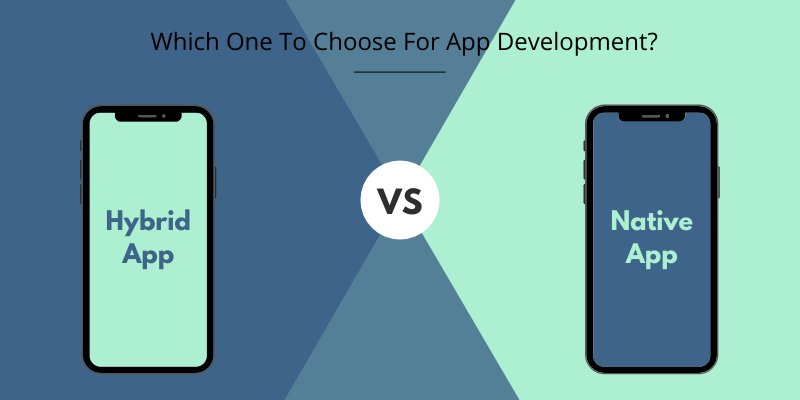Computers & IT
Hybrid vs Native App – Which One To Choose For App Development?

Planning to get a mobile app is really nice, but choosing the best platform for app development is more challenging. No one would ever want to invest in something indistinct and not worth the money. Once you decide that, ensure it has all the features you want and is a requirement for your business.
Aside from the features, functionality, and money, security is the most important factor in data breaching. Additionally, there are several other factors in mobile app development services that you essentially require and are functionally active.
After all these, you still stick to the question that asks, what is the best approach?
An introduction to Hybrid App
Hybrid applications are the same as other essential mobile apps. It is specifically designed to work on multiple platforms at once, such as Android and iOS. In a Hybrid mobile app, device-specific interplays are made using the plugins for the OS. A hybrid app is a combination of web and native apps. Its installation and functioning are similar to the native application, and the internal functioning is identical to a web application. But, each application and software has both advantages and disadvantages. Continue reading to know some of them for Hybrid apps.
Pros:
- Because of its feature of supporting multiple operations at once, it turns out to be significantly more cost-effective.
- It operates even when a device isn’t connected.
- Integrated web-based services.
Cons:
- Quality issues may cause bugs.
- Testing and proper workflow of application is a must.
An introduction to Native App
Unlike Hybrid, Native apps are developed for the specific platform they are installed on. These applications are written in the same language as the platform’s operating system; they were made in.
If it is for Android, then it must be written in Kotlin or Java and if it is for iOS, then it must be written in Swift.
Pros: Native applications can have access to mobile hardware, GPS, Camera, and accelerometer.
Cons: Native apps need much more investment than Hybrid and take time to launch.
Which platform to choose for mobile app development?
Be it Hybrid or Native, both of them have a clear approach to mobile web development services. Often developers are told to convey before time and within a budget limit, although the quality is substantially more impactful than quantity. Thus, While you choose the best mobile app development company for your business, here are a few vital points for you to note down.
1. Budget
Budget management is the most significant factor when it comes to mobile app development.
- Now, if I start the comparison between these 2 platforms, Hybrid is a lot less expensive because it can be created on a single written code.
- Whereas, It requires a shoestring size of the budget for a business to develop a native app for both Android and iOS separately.
2. Time Limit
The second most vital factor for app development is the amount of time it takes to develop an application.
- It takes much lesser time to create a Hybrid app than Native.
- The reason behind it is the feature of hybrid app development utilizing programming languages such as HTML, CSS, HTML5, and JavaScript.
- Whereas Native applications are platform-specific apps and take more time to write a code for each platform separately.
As I talked about on the budget point, Hybrid can be made utilizing a solitary code on multiple platforms, while Native is the exact inverse. In the long run, this makes Hybrid less tedious and takes much time for Native to launch it on all the platforms.
3. Updates and Maintenance
Mobile apps are developed to facilitate the lives and save time in this modern world. Many research reports have indicated that individuals are likely to expect more from mobile applications than from websites. Usually, users expect apps to load in 2-3 seconds, often achievable only with continuous updates and bug fixes.
- Timely updates, bug fixes, and high-performing apps are the most liked by the people.
- Somehow, Hybrid lacks performance quality because of its coding process, while Native apps don’t. Native apps have different written codebases, unlike Hybrid.
- Hybrid applications are a phenomenal approach for businesses that do not look for multiple optimizations for their apps, and with Native, it’s vice-versa.
4. Data Security
Data is the mainstay for any kind of business, and its security is very pivotal for them. However, data security relies upon the platform and the written codes when it comes to mobile app development. Security weaknesses of Hybrid have a higher ratio than the Native app. One should ensure that the code ought to not be easily accessible to hackers when it comes to data security.
Nonetheless, not all the Hybrid app codes are weak.
5. User Experience
User experience is the most important factor of a web app development process. A recent survey showed that over 75% of users get rid of the application after they face bugs once or twice. A user experience must be extraordinary if the users get what they exactly wanted.
What’s more, it would still be vague regardless of whether I turn towards simply an app working smoothly. Similarly, there’s a thin line between a smooth functioning app and a platform-specific app. This is one of the key reasons that a Native application offers a much more tremendous user experience than a Hybrid app does.
Wrapping up
Hybrid is the best platform for mobile app development for those who require MVP(minimum viable products), diminished costing, and timelines. In contrast, React Native app development services is a perfect solution for those who need top-notch performance and platform-specific features and functionalities.
Native applications follow the UI/UX standard for developing Android and iOS apps that allow users to navigate faster.
-

 Destinations4 days ago
Destinations4 days agoSave Money in London: Insider Tips for Budget Travellers
-

 USA News3 days ago
USA News3 days agoWhat Is The Current Us Elections Rating And Who Is Leading The Polls?
-

 Technology5 days ago
Technology5 days agoEnhancing Lead Management and Text Marketing with Launch Control’s All-in-One CRM
-

 Europe News3 days ago
Europe News3 days agoSee Rome on a Budget: History and Culture Without the Cost
-

 Travel3 days ago
Travel3 days agoHow to Make Friends in Southeast Asia Hostels: A Guide for Solo Travellers
-

 Climate Change3 days ago
Climate Change3 days agoCuba Faces Nationwide Power Grid Collapse Amidst Ongoing Crisis
-

 Travel3 days ago
Travel3 days agoSafe Travel in Mexico: Tips for a Hassle-Free Trip
-

 Destinations4 days ago
Destinations4 days agoArgentina Travel Guide: Tango, Wine, and Natural Wonders














